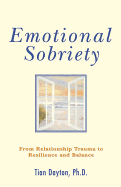- Description
Description
Do you use substances or engage in compulsive activities to regulate your mood? Do you reach for something sweet, a couple of drinks, or a pack of cigarettes after a difficult day because you can't unwind without them? Do you race to the stores to spend away the day's frustrations or run around in circles taking more time to get less done? If these self-defeating habits sound familiar, Emotional Sobriety will shed light on why and how these coping mechanisms threaten your health and impact resilience.
When we manage the stresses of the day by turning to outside 'mood managers' such as food, sex, work, shopping, gambling, drugs, and alcohol rather than healthier forms of 'self-soothing, ' it is because we lack emotional sobriety--the state of processing our thoughts efficiently to bring our emotions into balance, says bestselling author and renowned addictions psychologist Tian Dayton, Ph.D. In her latest book, Emotional Sobriety, Dr. Dayton shares compelling, honest tales of her life experiences and case studies of those she has counseled.
Illustrating that emotional sobriety is a mind/body phenomenon, Dr. Dayton includes ideas on how to attain emotional literacy--the skill of translating feelings into words so that we can use our thought processes to understand and bring our emotions into balance--and how to calm the limbic system so that we can actually experience what we're feeling. The limbic system processes our emotions and governs our mood, appetite, and sleep cycles. Repeated painful experiences, in childhood or adulthood, over which we have no ability or sense of control or escape can oversensitize us to stress andderegulate our limbic system. Dr. Dayton shows you through concrete examples how to bring your emotions and thoughts into balance and learn healthy ways of 'self-soothing' to relieve symptoms of depression, anxiety, rage, and the desire to self-medicate.



